

 |
 |
||||
| Home | Reviews | Extras | Forums |
|
Twin SpicaSynopsisFive years ago, a rocket launch that was supposed to be one of the high points of Japanese space travel, met with terrible disaster as a rocket booster exploded, sending the rocket itself into a nearby town, injuring and even killing many people. The space program was put on hold for quite some time after that, due to various scandals surrounding the program. One of the people who were killed in the accident was the mother of Asumi Kamogawa. Although a tragic accident by any measure, it nevertheless lit up a great passion for space travel in the young girl. Fresh off high school, she eventually joins the Tokyo National Space School with the intent of becoming an astronaut. With the help of the friends she makes there, as well as being adviced by Lion-san, a ghost of a man wearing a lion mask, the stars might not be as far out of reach as one would think. ReviewWhen I first sat down to synchro this show with Nicoletta, one of the first observations I made was that the show kinda felt dated... but in a good way. Which made me all the more surprised when I learned it was made in 2003. While that does make the show nearly 20 years old, it still leaves ten years between when I started getting into anime to when this show was made, so I still feel kind of weird calling it "old" or "retro". I guess "quaint" can do in a pinch. It also reminded me a bit of Rocket Girls, but as it turns out, the only thing the two shows have in common is that they're about high school girls aiming to go to space. The girls in Rocket Girls were more or less recruited for the chance to go to space in a somewhat rogue operation as operations go, while Twin Spica has its characters actively pursue it as a career both on an academical and historical level. 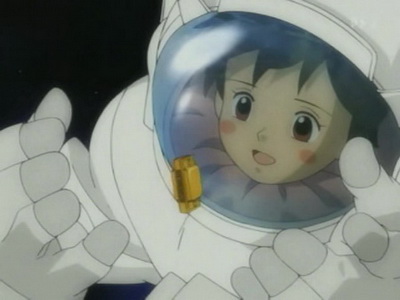 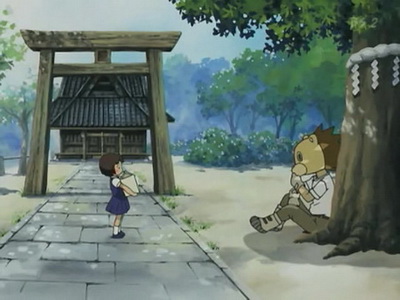 In an event more than a bit reminiscent of the Challenger tragedy, Asumi lost her mother, Kyoko, in that first attempt at space travel in Japan. It wasn't an instant loss either, as Kyoko spent five years in a coma before passing on, although Asumi was simply too young to fully understand what was going on. It was during that childhood and curiosity mixed with loss that she met Lion-san, the ghost of another person who died during the failed rocket launch that claimed her mother's life. In a sense, he becomes Asumi's mentor and tries his best to instill some knowledge of what is expected of her as a future astronaut, both on a physical and mental level. Which is not to say he's the show's resident drill sargeant; Asumi is just a child at the start of the show (as well as quite a few flashbacks), and Lion-san knows this, making sure to keep her active and thinking on her feet while also not completely overworking her. A single incident aside, I also immensely appreciated how well they portrayed her father, even if he is mostly just important during those first couple of episodes. They do a tremendous job of portraying a man who is a grieving husband (those five years couldn't possibly have been easy on him either) who also tries his best to be a good father. The incident I'm referring to is a scene where he slaps his own daughter, which was not very fun to watch. But said slap was immediately followed by a really heartwarming show of support from him, it kind of reminded me of a certain scene in Kobato -- where a young boy stood up for his mother for working her ass off to support them, even if that meant they wouldn't get to see each other as often as they would have liked. In the case of Tomoro, his wife's death doesn't stop him from supporting his daughter's dream, even if said dream is tied directly to the reason why his wife was taken away from the both of them. Not to say that those two are the only supporters in the Asumi fanclub. Shinnosuke Fuchuya is a young boy who seems to suffer from the rather well known anime disease "tsundereism". Out of her circle of friends, he's also the only one who has been there since her childhood. When entering space school, Asumi also meets the two girls whom she will endure the first test with, Kei Oumi and Marika Ukita. Kei is a bit of a busybody, and is easily the loudest of the lot. (Again, in a good way, as is this show's wont.) Marika, however, is generally unfriendly and cranky for the majority of the show, which anyone with at least some amount of pattern recognition will tell you is a clear sign of an unpleasant childhood or past in general. Her case is of course more complicated than that, although given that Twin Spica is a rather incomplete work of the manga it's based on, I had to get a little help from Nico to fully parse Marika's situation. Rounding off the boys' side is Shu Suzuki. He comes off as a bit of a slacker at first, but much like Marika, he doesn't have the best relationship with his father. He has a penchant of shaving off his eyebrows for reasons I can't remember offhand if the anime explained it. Another feather in Twin Spica's cap is how it presents its "villains". For all its sci-fi posturing, the show is wonderfully slice-of-life at times, with some dramatic moments added to spice things up. Takahito Sano is one of the teachers at the academy, and once he finds out that Asumi is enrolled, old wounds resurface and he puts every effort into sabotaging Asumi's attempts at becoming an astronaut. He does come across as majorly scummy at first, but as it turns out, the situation is a bit more complicated than that. The true villains aren't necessarily even human ones, when you get down to it, but more vices and corruption in general, as well as good ol' fashioned politics. Sano aside, and he does get his turn eventually when he learns more about what happens. I was a bit puzzled as to why he was kept out of the loop this long, but a quick look through the synopsis of the manga made that point quite clear. Objectively, yes, what Sano does is just really terrible; when he learns who Asumi's father is, he becomes quite single-mindedly obsessed with destroying her dream for incredibly petty reasons, but unlike a lot of more authentic villains, he also learns why he has been wrong all this time, and leaves on his own accord. 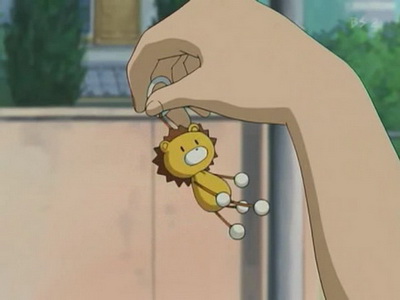 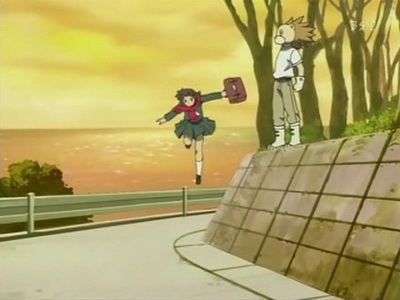 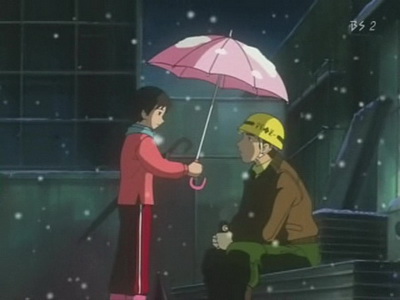 And while all the interpersonal drama is the main part of this show, I still have to tip my hat at all the science nerdery on display here. I can of course not tell whether the training Asumi and the others are going through is authentic, but it all feels very natural and well researched and serves as an interesting flavor to the drama, easing up some of the harder punches it'll throw your way while providing a nice framework for understanding Asumi's dreams growing up from her childhood ones. The rocket disaster and the consequences thereof are thankfully kept tastefully non-visual, including the part where Asumi tried befriending a girl who had been too close to it and suffered some pretty nasty burns as a result. The bullying the latter had to endure because of it are direct enough to be uncomfortable, but realistic enough for the show to realize a child isn't going to bully like an adult. For all its realism, Twin Spica does have a pretty nice supernatural side to itself. One theme I've seen in various anime shows over the years is how ghosts are often made up of people who died, only to linger as ghosts due to having unfinished business keeping them where they are. Asumi herself has a near death experience when, as a child, she almost drowns in a river. While unconscious, she is taken to the spirit world, where she meets people heading for the river to the land of the dead. It's through that we learn why Lion-san is a major character in the show despite being, y'know, dead, while Asumi's mother isn't, at least not in the same sense as Lion-san. There is a gentleness to the entire proceeding that is slightly reminiscent of Natsume's Book of Friends, although I have to wonder about Lion-san's mask, which looks kinda like a mix between a carnival lion mask and a cartoon explosion at the back of his cranium. It really ties in with the whole 90's feel that made me so surprised about the show being more of a Generation Z'er rathern tha the millennial it feels like. This is also partially because, style aside, the animation in the show looks pretty nice, a few weirdly floaty segments aside. The scenery has a very lovely small-town design, and the characters -- while not necessarily showcasing the expressiveness of newer, well-animated shows -- still lean into their actions and surroundings like a well-worn glove. 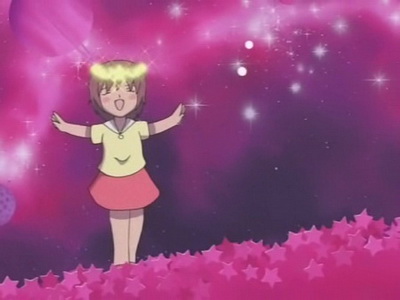 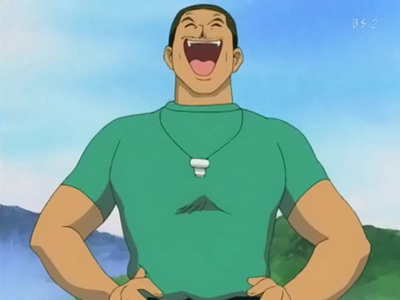 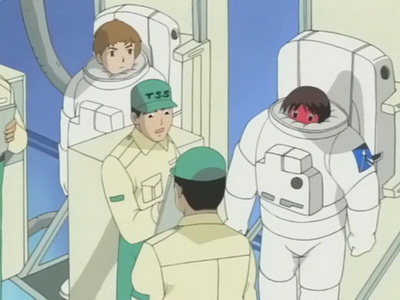 If there is anything to complain about when it comes to Twin Spica, then that would be how incomplete it is, and that's partially on us. The show covers six volumes of a sixteen volume manga, and I can't stress enough how under the radar this show was for me until Nicoletta brought it up as a synchro candidate. 20 episodes is a bit of an oddity as episode numbers go, but it does at least come to a pretty nice stopping point. Doinkies considered this show top quality, and I'm not about to argue with that. And since Nicoletta was the one who introduced it to me, I'm gonna let her have the last word. Nicoletta: Twin Spica might actually be the first show that Stig and I synchroed together where I picked a show he’d never really heard of before, and I’m glad he ended up enjoying it as much as me. I first came across this anime from its brief appearances in the AMV Hell Series, and I later found out that one of the guys who started that project actually worked on the unofficial English release that I watched. I have him and Doinkies to thank for putting it on my radar, I suppose, because it’s a really special show to me. I watched Twin Spica in Antarctica, when I was undertaking several of my own difficult journeys, but one of them involved setting off to do geology research in a cold, dangerous, lonely, and inhospitable world, the closest I’ll probably ever get to being in outer space. In a way, I turned to Asumi and her dream of reaching outer space as a sort of inspiration, and it helped a great deal during those weeks. This anime’s OP, “Venus Say” by BUZY, still has a place in my driving music playlists and still reminds me of Antarctica every time I hear it. Twin Spica is just a lovely and gentle, if sometimes achingly sad, show about a girl who wants to visit outer space, and it resonates with me in a lot of ways. Outside of the science connection, I also relate to it because to a big extent it’s about a bullied girl finding true friends and found family, over time, and I find the relationship between Asumi and Lion-san, her deceased friend, to be very endearing (if you ask me, also, just about every adolescent character in this show, male or female, has a crush on her). I really do wish this show had gone on longer and that more of the manga had been adapted, but I’m really glad that this show got made at all, and it was nice to find that I enjoyed it on second viewing as much as I did before. Twin Spica definitely still gets a strong recommendation from me. An underrated gem of a science fiction drama. — Stig Høgset Recommended Audience: This aired on NHK (the Japanese equivalent of America's PBS or the UK's BBC) so there isn't much that is objectionable. However, this series does talk about death and it is very emotional, so it is not recommended for the very little ones. Version(s) Viewed: Digital source Review Status: Full (20/20) Twin Spica © 2003 Yaginuma Kou / Media Factory / NHK / NEP / Sogo Vision |
 |
|
| © 1996-2015 THEM Anime Reviews. All rights reserved. |